
Section Branding
Header Content
Sacred Soil Scattered At Veterans Park
Primary Content

This Memorial Day the Atlanta History Center is dedicating its newly expanded Veterans Park. organizers will scatter so-called "sacred soil." It comes from battlefields around the world where Americans fought and died for our country.
Richard Lester, a retired army colonel who helped plan the Park heard the National Infantry Museum in Columbus had gathered soil from every American battlefield from the Revolutionary War to Iraq and Afganistan. He wanted to do the same thing but had just five weeks to prepare. He put out a call to fellow veterans and organizers were amazed at what they got back.
Jackson McQuigg is vice president of properties for the Atlanta History Center. He says they got “pieces of the sands from Iwo Jima, desert sand from Iraq, little bits and pieces of battlefields from the south Pacific, to small pieces of the Berlin Wall.”
They were able to gather soil from battlefields from the American Revolution, the War of 1812, the Spanish American War, World Wars I and II, the Korean War, the Vietnam War, Iraq and Afghanistan. They also got soil from Arlington National Cemetary. One third of the material is buried in a stainless steel container under a granite seal of the United States. One third was scattered during the Memorial Day ceremony, and one third will be kept at the History Center.
McQuigg says there are five more granite seals that are also 8 feet in diameter.
“It’s good old Georgia granite. We actually went to the quarry in Elberton and they were actually manufactured there in Elberton. " he says. " And they represent the five service branches, Army, Navy, Air Force, Marines and Coast Guard.”
There are also six interactive panels in the park. Each features a QR code. Anyone with a smart phone can listen to veterans interviews.
Ernest Wills, was a sergeant in the 6th Marine Division during World War II. In his video he describes the horrors he experienced in foxholes on the island of Okinawa in the spring of 1945. “We were laying there, trying to cover up with our ponchos, trying to keep dry. We felt so sticky. We found out why the next morning. Two guys were killed above us and all the blood run down all over us. War is something. Unless you’ve seen it, you can’t explain it.”
McQuigg says they will change the interactive panels regularly. “Veterans interviews will literally be available 100 percent of the time." he says. " Anyone can come out here on their own, whether or not the museum is open, and listen to one of those stories. And hopefully want to learn more, or actually decide that they want to contact us and share their stories with us as veterans.”
McQuigg says a brick and granite cascading fountain as you enter the Veterans Park helps contemplation. He says “Water also gives a sense of life to the park, and a sense of sort of enclosure.”
McQuigg says the park is not just a memorial to the fallen, but also to those who went to war and came home. “The story of veterans is so broad and so expansive and their role in the country is so huge that there’s no one way we can honor them. And I hope they will come here and realize that what we’ve presented is just scratching the surface of those stories. And the take away is, learn more.” McQuigg says since 9/11 there are so many more veterans. And many of their stories aren’t getting told.
He says the Veterans Park at the Atlanta History Center won’t allow people to forget the sacrifices and the bravery of all those who have served our country.
Tags: Atlanta History Center, sacred soil, Veterans Park
